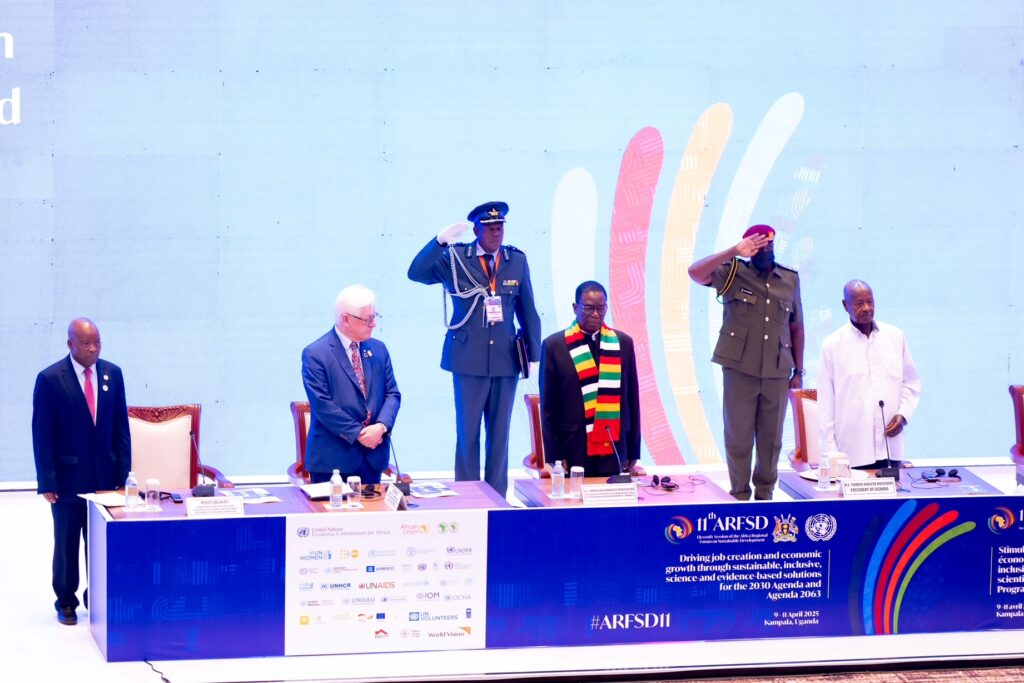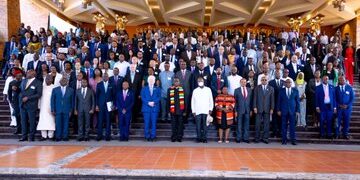President Yoweri Kaguta Museveni has called on African nations to champion their development agendas through homegrown solutions and stronger regional integration.
Addressing delegates at the 11th Session of the Africa Regional Forum on Sustainable Development (ARFSD-11), held at the Speke Resort Convention Centre in Munyonyo, Kampala, the President emphasised that external aid, while useful, cannot guarantee lasting progress.
Held under the theme “Driving job creation and economic growth through sustainable, inclusive, science and evidence-based solutions for the 2030 Agenda and Agenda 2063,” the three-day forum brings together leaders, policymakers, and development actors to shape Africa’s sustainable future.
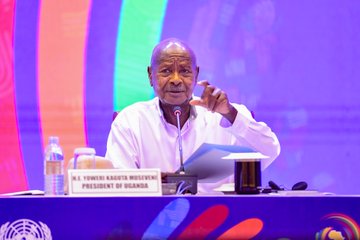
A Case for Self-Reliance
President Museveni, who was accompanied by First Lady and Minister of Education and Sports, Maama Janet Museveni, and H.E. Emmerson Dambudzo Mnangagwa, President of Zimbabwe, cited Uganda’s recent economic performance amid global criticism and reduced external support, following the country’s controversial legislation on homosexuality.
“The World Bank stopped lending. The US removed us from AGOA. But Uganda’s economy still grew by 6%. This proves we can stand on our own,” he said.
He stressed that sustainable development must be anchored in regional integration and domestic policy clarity, adding, “What matters is avoiding our own mistakes. With unity and discipline, we can go far.”
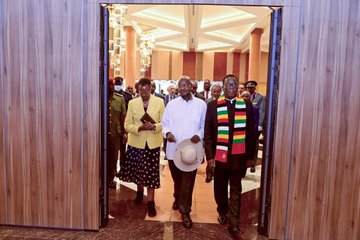
Uganda’s Economic Journey
The President traced Uganda’s economic evolution from a barter-based, subsistence economy in 1900 to a modernizing state. He explained how colonial authorities built a narrow enclave economy based on cotton, coffee, copper, and a few other exports—an economy that only reached 4% of homesteads.
By 1986, the NRM inherited a collapsed system. Museveni detailed five key phases of Uganda’s recovery: reviving the colonial-era enclave economy (cotton, coffee, copper, etc.), expanding traditional exports —coffee exports, for example, rose from 3 million bags in 1986 to 9 million today, diversifying into new sectors like dairy, maize, fruits, fish, and leather, investing in value addition to retain more income and jobs domestically and transitioning to a knowledge economy, including manufacturing of vehicles, vaccines, and computers.
He noted a key challenge remained: moving citizens from subsistence farming into the money economy. As of 2013, 68% of homesteads were still outside the cash economy.
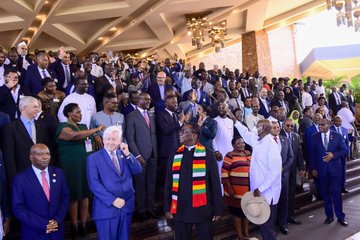
PDM and the Power of ‘Ekibaro’
To address this, the government launched Operation Wealth Creation and later the Parish Development Model (PDM)—targeting economic transformation at the grassroots. Museveni emphasized the importance of guiding farmers to adopt economically viable enterprises—what he called “ekibaro” (cost-benefit logic).
He outlined Uganda’s vast agricultural potential, noting that just 7 million acres of productive land could create over 100 million jobs—more than twice the current population.
While agriculture remains a core pillar, Museveni also highlighted the importance of industry, services, and ICT as engines of growth. Today, Agriculture employs 3.6 million people; Industry: 1.4 million; Services: 5 million and ICT: 46,000+.
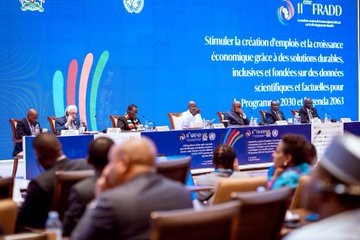
For transformation to be sustainable, the President identified key enablers: low-cost transport (rail and water), affordable electricity, access to credit, value addition, and a skilled, healthy workforce.
He warned, “Quantitative growth without transformation is a recipe for perpetual underdevelopment.”
Global Solidarity and Calls to Action
Mr. Robert Keith Rae, Canada’s Ambassador to the UN and President of ECOSOC, emphasised Africa’s central role in achieving the SDGs. He called for solidarity in tackling shared global challenges—from climate change to trade inequality.
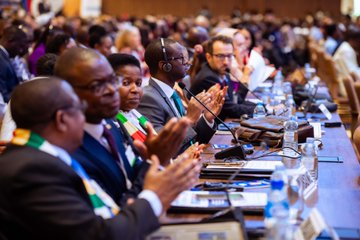
“Your struggle is not only your struggle; it is the world’s struggle,” he said, urging countries to invest in education, especially for girls, and reduce the prosperity gap.
H.E. Amina Mohammed, UN Deputy Secretary-General, called for bold financing reforms and homegrown solutions to bridge the SDG resource gap. She noted that over 60% of African countries spend significant revenues on debt servicing.
She also praised African women as drivers of transformation and stressed the urgency of addressing gender-based violence.
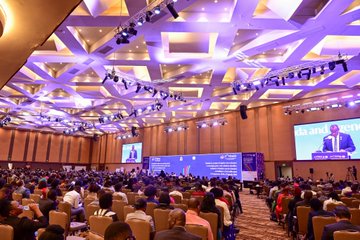
Mr. Claver Gatete, Executive Secretary of UNECA, commended Uganda’s leadership and stressed the importance of leveraging Africa’s youthful population.
He outlined four pillars to accelerate SDG progress: curbing illicit financial flows, unlocking domestic capital, expanding access to finance (especially for women and youth) and harnessing the African Continental Free Trade Area (AfCFTA).
The event also saw the participation of Uganda’s Prime Minister, Rt. Hon. Robinah Nabbanja, 3rd Deputy Prime Minister, Rt. Hon. Rukia Nakadama, various ministers, and development partners.
